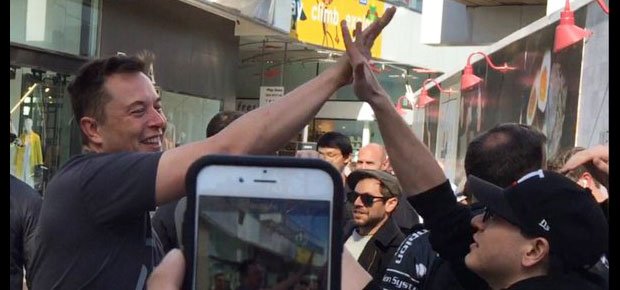
[ad_1]
It’s hard to believe that the founder of Tesla Motors and SpaceX could have such reactionary views about artificial intelligence. Elon Musk last weekend had some very un-Musk-like things to say about AI when he addressed the U.S. National Governors Association meeting in Providence, Rhode Island. “AI is a fundamental existential risk for human civilization, and I don’t think people fully appreciate that,” Musk said. He even suggested that government ought to regulate the nascent industry — but it’s hard to regulate that which isn’t yet formed. It’s reminiscent of what happened when the George W. Bush administration decided to restrict stem cell research. The regulation didn’t work because the research simply moved to more friendly jurisdictions.
It harkens back to the warning of Jurassic Park character Dr. Malcolm — that life always finds a workaround. AI will be no different, so we need to embrace it and work with it.
What’s striking is that those pronouncements came from the man who reinvented the space program as a for-profit industry, and who also took the electric car to the edge of technological capability and then busted through all barriers.
In both cases, something new and good resulted. In space, Musk’s company this year demonstrated lift capacity to launch 10 satellites at once and return its booster rocket to Earth for an upright landing.
His other company’s cars, though expensive, gradually have been reaching the general marketplace, and there is a multibillion dollar waiting list for the next model.
Fly Like Lindbergh
It would be Pollyannish not to acknowledge that things don’t always work out, but then again, even when things go sideways it’s exceedingly rare that they threaten human civilization.
To unpack this: For all the notoriety Musk’s success has brought him, it’s worth remembering that his greatest successes have been in reimagining existing paradigms, like cars and space.
Before that Musk had a lot to do with getting PayPal up and running. There’s nothing wrong with any of that. Musk has shown that you can make a lot of money building a better mousetrap. However, his comments suggest that he might not be as well positioned on the cutting edge as we’ve been led to believe.
Way out there on the cutting edge, there are no paradigms to improve. You have to make things up out of whole cloth, and it’s hard. Consider the difference between John Harrison and Charles Lindbergh.
Lindbergh, an aviator, was first to cross the Atlantic in an airplane, and he won the US$25,000 Orteig prize (more than $300,000 in current funds) for doing so. If he hadn’t been the one, some other person would have performed the feat, because there were multiple teams jockeying for position at the time.
Most importantly, the solution to the problem was constructed from off-the-shelf parts. It takes nothing away from the courage and stamina of the man who could stay awake for more than 33 hours to make the trip to recognize that Lindbergh’s feat was of a different order than Harrison’s accomplishment.
Navigate Like Harrison
Two centuries earlier, Harrison figured out how to determine longitude at sea and won most of a prize established in 1714 by the British parliament for a successful solution. The Longitude Prize was worth a cool Pounds 20,000 — equal to about Pounds 2.5 million today.
Harrison was a carpenter and clock maker. He knew a lot about making a standing pendulum clock with wooden gears. However, his solution to longitude involved building a clock out of metal, without a pendulum, and capable of precision not seen up to that time.
Harrison had to reinvent timekeeping, and the result was the first chronometer capable of encountering life at sea and maintaining the correct time within a small margin.
So perhaps Musk is more Lindberghesque than Harrisonian — more into improving solutions than inventing his own. The whole idea of the brave new world of AI can seem scary to him — and thus his crusade to save us.
Musk’s Providence pronouncements were not the first cautionary words he has offered on AI. His warnings earned a lengthy treatment earlier this year in a Vanity Fair article by Maureen Dowd, “Elon Musk’s Billion-Dollar Crusade to Stop the A.I. Apocalypse,” which details his efforts to “save humanity from machine-learning overlords.”
Really?
On the other hand, Musk’s Tesla factories are models of robotic efficiency and seem to be a significant counterfactual to his statements in Providence. However, robotic assembly lines might be drone-like compared with Musk’s vision of powerful AI. Possibly, he is angling to clear out some space for a new venture he’s been incubating.
Neural Lace
Musk’s new company, Neuralink, might be an attempt to build what he’s called a “neural lace,” which might function as a kind of interface between the human brain and machines.
There aren’t many details yet, so keep an eye out for whatever’s next. Meanwhile, I’d take the Providence declaration with a bowl of chowder.
Everywhere we look today, things are changing in fundamental ways. The AI scare — and that’s what it is — was forecasted a few years ago in The Second Machine Age, by a couple of MIT professors who warned that the acceleration and disorientation we feel is exactly what happens in the second half of an exponential growth curve.
There’s no doubt that job losses can be scary, and the new era never arrives in time to short-circuit the pain associated with the end of a prior era. Still, there are lots of things we can do to smooth the situation.
First and foremost, we can quit the unproductive doomsday talk and figure out in earnest how to take advantage of what’s before us.
We also can embrace the change and actively participate in its rollout. Participation yields control, and that’s far more useful than trying to shut something down.
We’re looking at a free market phenomenon, which means it has a momentum of its own that won’t be stopped by regulation — more or less the same situation Dr. Malcolm found himself in. By the way, electric cars are the same type of free market phenomenon, so it’s a pity their patron hasn’t seen that yet.
[ad_2]
Source link






